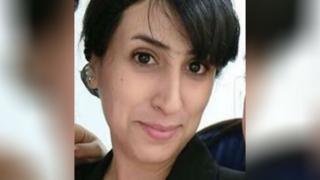[ad_1]

Mitra Mehrad studied mental health issues among her compatriots
A migrant who died while trying to cross the Channel wanted to help fellow Iranians, it can be revealed.
Mitra Mehrad, 31, fell from a dinghy off the coast of Kent in August and her body was later found in Dutch waters.
Police have now confirmed her identity with the help of the BBC.
Ms Mehrad, who had started a PhD in counselling psychology, wanted to help her compatriots by researching mental health issues among Iranians, her friends said.
A massive rescue effort was launched on 9 August when she and three others fell from a flimsy vessel ferrying 20 migrants – including four children – from northern France to the English coast in rough seas.
Two were pulled from the water, and 19 people – 14 from Iran and 5 from Iraq – were brought to Ramsgate by the RNLI but there was no sign of Ms Mehrad.
Helicopters from both British and Belgian coastguards joined the search, which continued at first light the following day.
Her body was eventually found by a guard ship at a wind farm more than 30 miles off the coast of the Netherlands on 18 August.
Mitra Mehrad had a masters degree in psychology
Dutch police were only able to positively ID her body this week after the BBC tracked down Ms Mehrad’s father and helped to arrange a visit to their embassy in Tehran.
A DNA sample was flown back to a lab in The Netherlands and Ms Mehrad’s father was given the news on Tuesday.
‘That was her desire’
The student had left the family home in the south-western Khuzestan province to complete her psychology masters degree, graduating from Assumption University in Bangkok, Thailand, in 2017.
Parvathy Varma, a lecturer who supervised Ms Mehrad’s thesis, said: “She was a highly motivated person. She wanted to work hard and get a PHD and be settled, that was her desire.”
Her thesis looked at mental health issues in the Iranian population and she travelled back to Iran to conduct research, working in a hospital while she collected data on personality disorders.
“She wanted to help people in her homeland,” Mrs Varma said. “She said the reason why she wanted to do her research area was because people have a lot of these personality issues [in Iran].”
She recalled that her student had told her: “I don’t want to do any research that isn’t useful to my people.”
Ms Mehrad started her PhD but was unable to find a job in Bangkok that could support her studies, Mrs Varma said. At some point in early 2019, she left Thailand, eventually arriving in France.
Image copyright
SNSM
The French rescued migrants found clinging to the hull of their dinghy on the day Ms Mehrad died
It is not clear exactly when she settled upon the plan to pay smugglers to carry her across the Channel, but it seems she kept it secret from friends, who were shocked to learn how she died.
In February, she had told colleagues she was planning to travel to Canada to continue her research.
Mrs Varma said they shared a joke about her plans. “I was thinking, what, all of a sudden Canada, did you find a Canadian boyfriend? She said no, no, no, I’ll talk to you later.”
“She also said: ”Please pray for me’. Then I thought maybe she was into something.”
‘Desperate to leave’
According to Dutch police, by early August Ms Mehrad had arrived at a makeshift camp at the Grande Synthe gymnasium in Dunkirk, which was home to hundreds of other migrants, many of them Iranian.
The National Crime Agency warned earlier this year that the camp was controlled by OCGs – or organised crime groups – who are “willing to use violence to threaten migrants into travelling to the UK by boat”.
Two men, who helped to organise Ms Mehrad’s crossing, have been jailed for manslaughter in France.
She was spoken to by the Refugee Women’s Centre at the camp, where she spent just a handful of days before embarking on the doomed journey. Mrs Varma said she could not understand why Ms Mehrad made such a decision.
“That is the part I couldn’t actually believe. Why was she so desperate to leave?”
Newspapers in the UK and the Netherlands named Ms Mehrad shortly after she fell from the boat, but Dutch police spokesman Ed Kraszewski said they had been unable to say for certain until her father’s DNA proved a match.
“We can’t say she is probably dead,” he said. “We have to be sure. That’s the same for her father. He has to be sure, otherwise he can go through all his life waiting.
“I know from other missing [person] cases, the people who stay behind have hope [their loved ones] will come back.”
Mr Kraszewski said the positive DNA match had ended a painful wait for Ms Mehrad’s family, who, more than four months after she died, can finally make arrangements to lay her to rest.
[ad_2]
Source link

